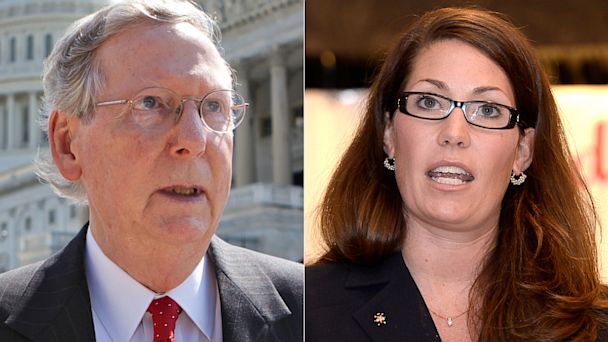Kentucky Dems Try to Put McConnell on Defensive Over Obamacare

(J. Scott Applewhite/AP Photo | Timothy D. Easley/AP Photo)
Senate Minority Leader Mitch McConnell was accused today of campaign sleight of hand for demanding the repeal of Obamacare - which is very unpopular in Kentucky - while ignoring the effect it could have on Kentucky's health care exchange which has proved to be well received in the state.
McConnell has tried to make Obamacare a pivotal issue in his reelection bid, repeatedly pointing out that his Democratic challenger Alison Lundergan Grimes has refused to say whether she would have voted for the Affordable Care Act.
McConnell was put somewhat on the defensive when ABC News' Louisville affiliate WHAS asked him at a press conference Friday if Kynect, the state's health care exchange, should also be dismantled.
"I think that's unconnected to my comments about the overall question here," McConnell told WHAS' political editor Joe Arnold.
More than 400,000 Kentuckians have health insurance through the exchange known as Kynect, which was created by the state under the Obamacare law. Kynect seems to be working in the state, and a threat to the exchange could put McConnell in a bit of a political bind.
Kynect could legally stand without Obamacare, but health care and political observers note there would be no political will in the state, nor federal funds, for that to happen. The Kentucky campaign issue points to the question of what would happen in the 14 other states plus the District of Columbia that have created their own insurance marketplaces if Obamacare was repealed. A source close to McConnell points out that while Kentucky built its exchange with administrative funds from the federal government it won't continue receiving that money to maintain it.
Democrats have jumped on McConnell's comments with Grimes' campaign manager Jonathan Hurst saying, "Mitch McConnell has been in the fantasyland that is Washington for so long that he cannot tell the difference between fact and fiction."
"McConnell has voted to destroy Kynect - and he has said he will do it again. In the U.S. Senate, Alison Lundergan Grimes will fix the law to ensure it is working for all Kentuckians," Hurst said in a statement.
Rep. John Yarmuth, D-Ky., took to the House floor today, saying, "McConnell's claim that we can keep Kynect and still repeal the Affordable Care Act is as absurd as it is disingenuous, and our constituents deserve to know that."
Stephen Voss, professor of political science at the University of Kentucky, said that the "major pivot Democrats need to make on the health care debate is instead of it being about Obamacare to being about Kynect since voters have a much more negative opinion of Obamacare than they do of Kynect."
"Kynect has the potential to be a positive for Grimes," Voss said, noting voters have "very strong opinions about Obamacare and they are overwhelmingly negative. It's a great chance for Democrats (to)…pivot the debate in to a more favorable direction for them. Right now the Democrats much prefer the health care debate to be about Kynect than Obama care."
It is a quite a wonky issue. The Washington Post's Fact Checker Glenn Kessler dug into the issue and noted McConnell's answer does not touch on what would happen to the more than 300,000 Kentuckians who did not sign up for private health insurance through Kynect, but instead signed up for Medicaid, the program for lower-income Americans that was expanded in some states that agreed to it thanks to the ACA.
McConnell campaign manager Jesse Benton told Kessler "when Obamacare is repealed, Kentucky can choose to continue Kynect or alter it in a way that makes the best sense for Kentuckians," noting "the federal start-up and operational funding for exchanges under Obamacare expires at the end of 2014 regardless of what happens to the federal law. "
When asked what would happen to those 300,000 people on Medicaid if the ACA was gutted, Benton responded: "Medicaid existed before Obama care and will exist if we are able to repeal it. Obama care loosened eligibility requirements for Medicaid recipients, and in the process, helped find many who were already eligible but not enrolled. These people would remain eligible even after a repeal."
The complexity of the issue works in McConnell's favor, Voss said.
"Both positions have an element of truth, but for the regular voter it is too complicated to move the needle," Voss said.